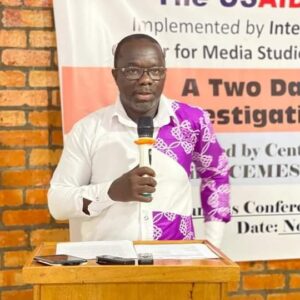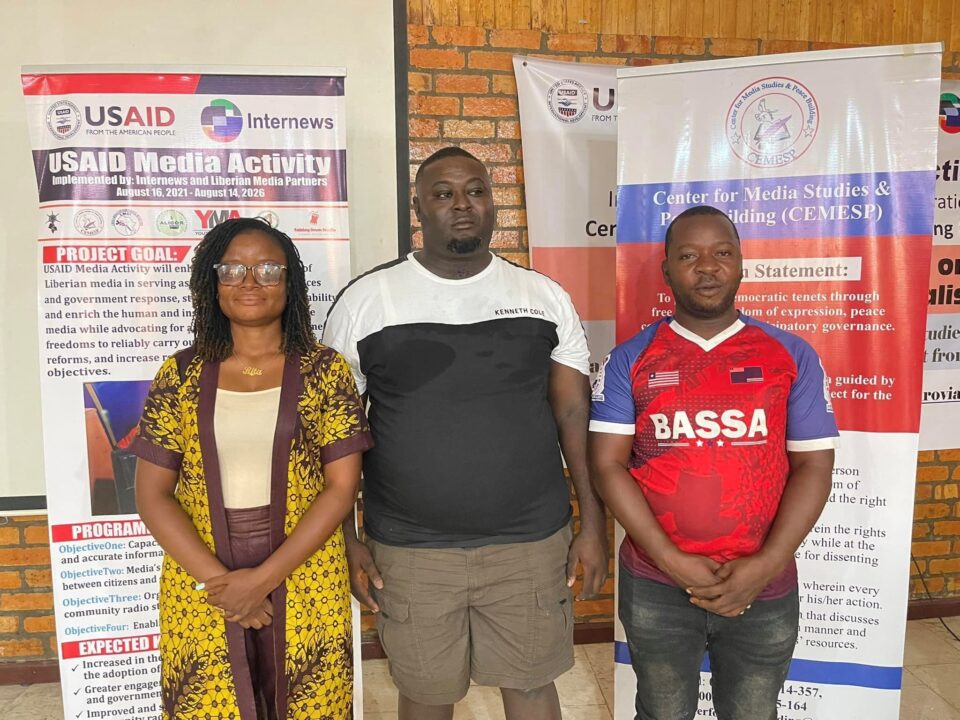Female Journalist. 2 Others Elected To Lead Network, After Seminar In Monrovia
PHOTO: Newly elected leaders of the LIJN
By Kelvin Gonlah, gonlahkelvin1995@gmail.com
A young Liberian female Journalist has been elected with two other officials to lead the newly formed Liberia Investigative Journalism Network (LIJN), at the end of a two-day Investigative Journalism seminar in Monrovia, which brought together investigative Journalists from across the country.
The seminar, which was organized by the Center for Media Studies and Peacebuilding (CEMESP) with support from USAID through Internews Media Activity in Liberia, further built the capacities of more than 20 participants in investigative Journalism, sourcing funding for investigation and networking.
Journalists Rita Jlogbe Doue, VOA Correspondent in Liberia was elected Coordinator of LIJN, while Emmanuel Digleh of Classic FM in Margibi County and Elton Tiah of Ableejay TV in Grand Bassa County were elected Deputy Coordinator and Secretary of the newly formed organization for a one-year period at the close of the seminar held at the ICAMPUS on Carey Street on Tuesday November 7, 2023.

Seminar participants pose for picture
Serving as keynote speaker at the forum, the Chairman of the Department of Communications and Media Studies at the University of Liberia (UL), Euriahs Togar said that Investigative Journalism is an important but an often overlooked and ignored pillar of journalism.
He explained that it is a key pillar of the journalism practice because it goes beyond the mundane to hold power to account, resolutely and persistently working to uncover hidden truths, and it serves as a guardian of democracy, bringing to light issues that would otherwise remain concealed.

“Access to information is crucial to investigative journalism and journalism as a whole and is essential for investigative journalism as it empowers journalists to effectively perform the socially ascribed role of watchdog for society. For investigative journalists to be effective in holding governments, corporations, and institutions accountable for their actions, as well as exposing wrongdoing that will otherwise remain buried, they must have unhindered and unfettered access to information. To reveal the truth and help the public to understand complex societal issues, investigative journalists must have unhindered and unfettered access to information to gather evidence, and data, and coherently organize facts to support their investigations,” the UL Communications Department Chairman noted.
“Investigative journalism often requires extensive research, analysis, and in-depth reporting, all of which takes time and resources to achieve. Investigative journalists will need adequate funding will allow them to devote the necessary time and resources to pursue complex and sometimes illusive investigations that may take months or even years. Access to grants and also pointing to funding sources to support in-depth investigations are important and also imperative,” Mr. Togar said.
He added that in an era where journalism strongly intersects with technology, providing technical and logistical support to education institutions can be another way to support continuous education and training of investigative journalists.
“Besides, media literacy empowers individuals to be informed consumers of news and contributes to a robust and responsible media ecosystem. With the prevalence of misinformation becoming a significant problem and to social cohesion, empowering news consumers with the requisite knowledge and skills to distinguish between reliable sources and those that may have ulterior motives will lead to an appreciation of the role and work of media institutions and journalists and increase trust in the media and journalists, especially investigative journalists,” the UL Communications Department Chairman added.
Great initiative says Internews
Musa Sangerie, Internews Regional Program Manager of West and Central Africa, who attended the forum, expressed his deep gratitude for such a great initiative by CEMESP and Internews to train Liberia Journalists to investigate critical stories, and it requires diligent time.

“I want to emphasize that the work you are doing is critical in terms of national development because it contributes to enhancing the accountability of good governance in society. When you go about investigative journalism, there are risks associated with it but there are significant gains for the country. Some of the ills in society by holding leaders accountable for the things that they do and it will usher in some significant development”, said Musa Sangerie, Internews regional manager of West Africa and Central Africa.
“Investigative journalism is not just a normal journalism that you just report, so it requires extensive research, it requires dedication and commitment. In some cases, lasts for months. It means that you have to go deeper to get the evidence on a subject matter you are interested in and when you have the report out, this is something that is expected to create national authority or local government,” Mr. Sangerie added.
CEMESP on critical role of investigative Journalism
Also speaking during the seminar, the Executive Director of CEMESP, Malcolm W. Joseph explained that investigative journalism plays a critical role in undermining and bringing to light societal injustices, human rights, and other things.
Investigative story should be published by requiring editors, lawyers, and even fact-checkers to ensure that it has legal and factual accuracy, Mr. Joseph explained.
“As an investigative journalist, working on sensitive issues, you need to bear in mind that you may face threats, and intimidation from those seeking to suppress the news. Powerful entity, any individual will use tactics to withhold advertising revenue. Is the lifeblood of the media to silence you and your media entity? These are landmark cases around the world as it relates to investigative journalism,” said the CEMESP boss.

Mr. Joseph disclosed that Internews has provided funds to help facilitate content gathering by the Investigative Journalism Fellows under the project being implemented by CEMESP in Liberia.
He then recounted strides being made by Liberian Journalists digging out hidden issues and reporting them in the interest of the public and to promote good Journalism.
“In Liberia, we can also look at the case involving Rodney Sieh and the former Agriculture Minister that led Rodney Sieh in prison, we can also look at Senator Dillon’s fight ticket saga which was written by Lennart Dodoo that made Senator Dillon apologize. We can also look at the procurement process from the elections commission which was written by one of our fellows and a couple of other stories. At the end of the day, we are expected that we will be able to launch a Liberia investigative journalism network,” the CEMESP Executive Director told the opening of the just-ended investigative Journalism seminar.
Meanwhile, the Senior Media Advisor at Internews Liberia, Jefferson Massah informed the Liberian investigative Journalists that its donors USAID has lot of interest in supporting the development of investigative Journalism in Liberia.

He said part of the support from Internews to the LIJN will be to support a team of Liberian Lawyers who will provide legal guidance and defense for Journalists in their line of duty.

